Égypte : la peur et l’initiative changent de camp
Les derniers évènements du 22 mars baptisés « bataille de la colline », lors de laquelle des milliers de manifestants ont tenté de mettre à sac le Quartier Général des Frères Musulmans dans le quartier de Moqattam au Caire et l’ont fait réellement dans le quartier de Monial ou dans les villes de Mahalla, Alexandrie ou Mansoura, ont mis au grand jour les évolutions souterraines de la conscience politique des Égyptiens ces derniers mois.
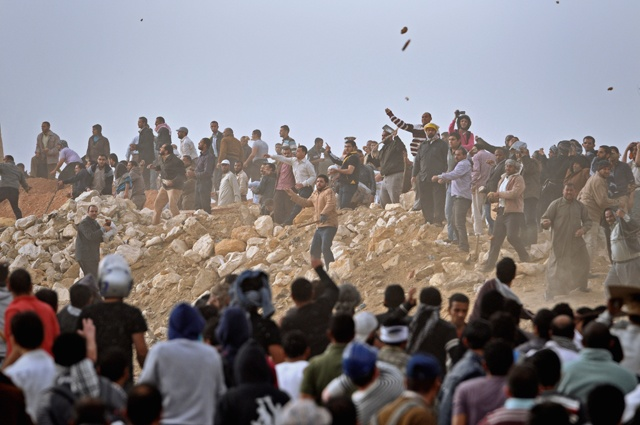
Les policiers et les islamistes ont peur
Lors de la révolution du 25 janvier 2011, les Égyptiens disaient que le principal acquis de la révolution était qu’ils n’avaient plus peur.
Deux ans et deux mois après, sous le régime militaire du CSFA ou celui des Frères Musulmans et leurs alliés salafistes et jihadistes, malgré l’utilisation régulière par les forces de police de balles réelles contre des manifestants pacifiques faisant des milliers de blessés et des centaines de morts, malgré les 12 à 15’000 condamnations à la prison de manifestants, malgré les tribunaux militaires pour les civils, les violences des milices islamiques, les détentions illégales, la torture y compris à l’encontre des enfants, les centres de détentions illégaux livrés au sadisme de tortionnaires, les obligations aux tests de virginité pour les manifestantes, leurs viols fréquents, malgré les arrestations arbitraires, des procureurs aux ordres, les mensonges, les fabrications de preuves, les faux examens médicaux, les multiples lois qui restreignent ou interdisent grèves et manifestations, malgré les lois martiales et les couvre feux, malgré les chars dans les rues, devant les écoles et les usines, malgré les menaces des chefs religieux musulmans ou chrétiens que les manifestants finissent brûlés en enfer, malgré les appels de l’opposition laïque du FSN au calme et aux manifestations pacifiques, malgré sa dénonciation des manifestants qui se défendent comme ils peuvent face à la violence institutionnelle, malgré ses projets actuels de co-gouverner avec les salafistes et les Frères Musulmans, malgré tout cela, la violence policière du régime ne fait plus rentrer les gens chez eux, terrorisés, mais les fait au contraire descendre dans la rue encore plus nombreux, encore plus en colère, encore plus déterminés et conscients.
Au point que le sport national est en passe de devenir l’incendie de préfectures, commissariats, véhicules de police et tous bâtiments appartenant à la police mais aussi aux Frères Musulmans et leur parti ainsi que le blocage des routes et des voix ferrées. Et il ne s’agit pas du passe temps de jeunes militants révolutionnaires dans les grandes villes mais de celui de tout un peuple jusque dans le plus petit village du pays.
Cela fait que maintenant — on l’a vu tout particulièrement en ces mois de février et mars 2013 — la peur a changé de camp : les policiers et les islamistes ont peur et tout le monde le voit. Il y a encore peu, même après la révolution, contre les violences de l’État ou des islamistes, on courbait le dos, on espérait au mieux une enquête et on protestait pacifiquement dans la rue. La police usait de violences contre ces manifestations et on recommençait. Une minorité seulement osait relever vraiment la tête et répondre. La presse, le plus souvent, s’accordait alors pour dénoncer la fatigue du peuple égyptien qui n’aurait plus supporté les violences exagérées de ses jeunes révolutionnaires. Aujourd’hui, cet état d’esprit est très largement dépassé et c’est tout un peuple qui a à l’esprit, « sang pour sang » et justice populaire directe.
Les policiers humiliés, apeurés, incertains de leur avenir, sous les ordres de Frères Musulmans qu’ils pourchassaient hier, se sachant haïs par un peuple qui n’a plus peur d’eux, remplissent les hôpitaux psychiatriques ou font grève comme en mars, face à un choix d’une logique infernale pour eux : soit le droit d’encore plus tuer et torturer soit leur fuite avec drapeau blanc comme on a vu certains policiers le faire à Port-Saïd en février soit encore faire pression sur le gouvernement comme ils l’ont fait en mars en demandant la démission du ministre de l’intérieur et une autre politique sociale qui ne fasse plus d’eux les boucs émissaires de la colère populaire. Quoi qu’il en soit, l’État policier est en faillite.
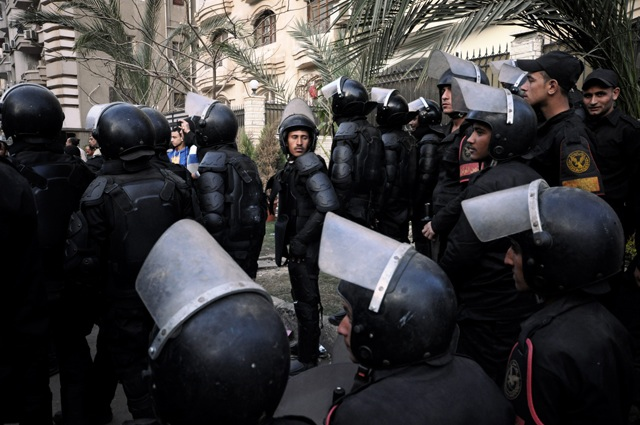
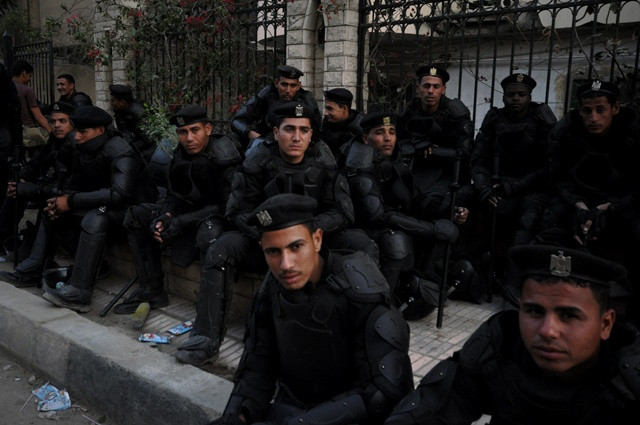
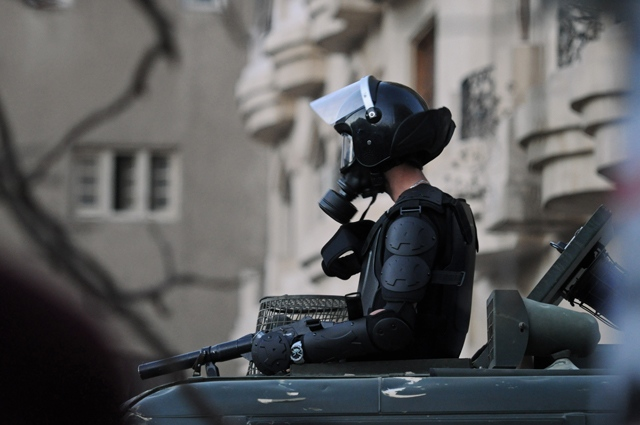
Il en va de même en ce qui concerne les islamistes. On voit des taxis au Caire portant l’écriteau « interdit aux Frères Musulmans », des prédicateurs en mosquée dénoncer les islamistes qui sont de faux musulmans, ces croyants scander dans les mosquées « À mort M. Badie » (le dirigeant des Frères Musulmans), des manifestants brûler des drapeaux du Qatar, des femmes lyncher des salafistes qui tentaient de les harceler, des femmes encore défiler armées de couteaux de cuisine en en menaçant tous les harceleurs, islamistes en premier lieu, des femmes toujours se dénudant devant les écrans d’internet et criant la libre disposition de leurs corps contre toutes les religions, des jeunes conférenciers de 18 ans faire des exposés très suivis sur l’athéisme dans des mosquées, des centaines de milliers de manifestants scander des slogans identifiant islamisme et fascisme…
Le score électoral des frères Musulmans en milieux professionnels illustre cette transformation radicale des esprits. En mars 2013, après son effondrement dans les élections politiques, il s’écroule aux élections professionnelles chez les étudiants, les journalistes, les pharmaciens avant probablement qu’il ne s’effondre aussi chez les avocats, médecins ou enseignants… alors que les étudiants et les professions libérales étaient le fief des islamistes et leur moyen d’influencer les milieux plus populaires.
La « bataille de la colline » est la partie visible de ce séisme mental. La religion d’obédience saoudienne, conçue comme une police des esprits est devenue tout aussi insupportable que l’État policier lui-même. Cet islam, imposé au peuple par les régimes militaires de Sadate et Moubarak par de multiples pressions jusqu’aux primes aux familles qui voilaient leurs filles et l’abandon volontaire aux Frères Musulmans, dans un partage des pouvoirs, des syndicats professionnels et de la charité publique, toute cette prison mentale se désagrège.
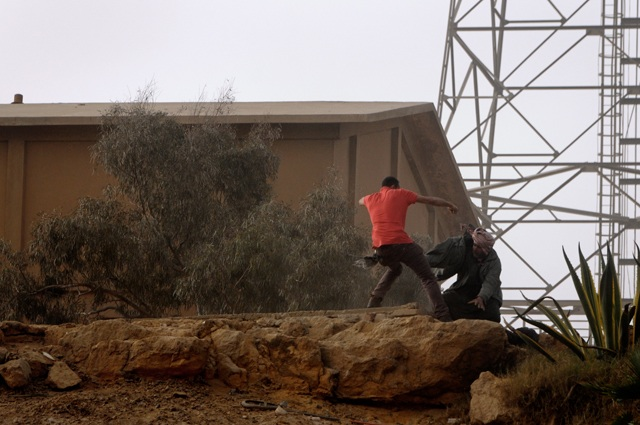
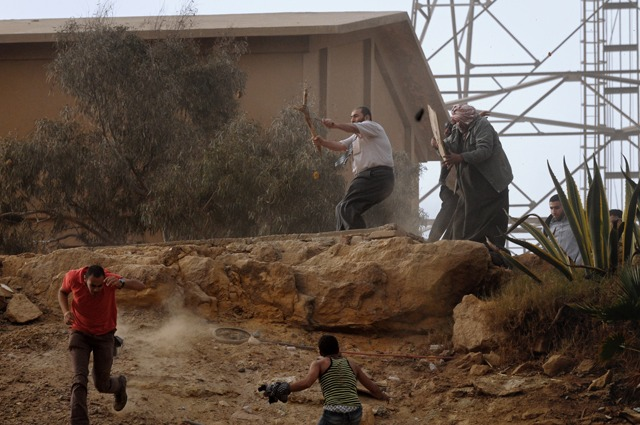
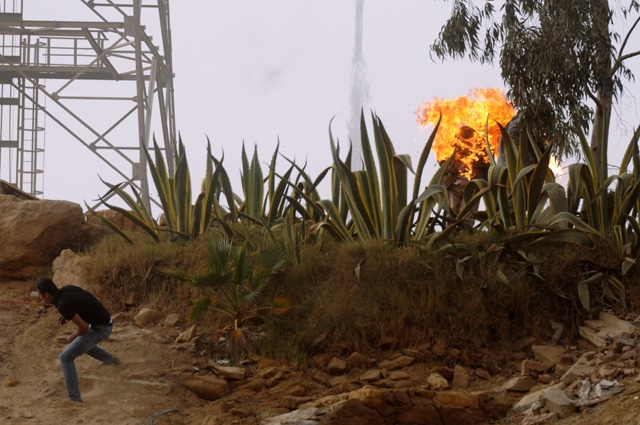
Une anecdote révélatrice : à l’université Al Ahzar du Caire, l’épicentre moyen-oriental prestigieux du conservatisme religieux dominé par les Frères Musulmans et les Salafistes, où le rire et la musique ne sont pas bien vus, un étudiant à joué de la guitare comme on l’imagine d’un hippie des années 60 et autour de lui tout le monde s’est mis à chanter, pendant que dans ce temple de la spiritualité et de la misogynie, un mouvement de grève dure depuis une semaine… pour l’amélioration de la nourriture, des dortoirs et plus de respect pour les femmes. À l’université britannique privée du Caire où les études commerciales comptent pour beaucoup, les étudiants ont fait grève, demandant le départ du directeur pour exiger qu’on n’y fasse plus l’apologie du profit dans les études. Le saint Coran ou le saint Capital… tout fout le camp !
Désagrégation de l’autorité de l’État, crise économique, révolution de la faim et embryons de démocratie directe
Mais il y a plus. Avec la désagrégation de la police et de l’autorité des frères Musulmans et autres islamistes, c’est l’ autorité de l’État lui-même qui se désagrège ouvrant la porte à la démocratie directe comme l’espèrent certains ou au chaos comme le craignent d’autres.
Selon Hani Shukrallah, un des éditorialistes les plus lus dans le pays, l’Égypte est entrée dans une nouvelle trajectoire historique du même type que celle qui a suivi la défaite de Napoléon sous les pyramides avec Mohamed Ali ou le moment qui a suivi l’indépendance avec Nasser. Avec la désagrégation de l’autorité de l’État et de la religion, l’apparition de milices islamistes, il craint certes la possibilité d’une évolution somalienne et de ses seigneurs de guerre comme la Chine et la Russie post-révolutionnaires en ont connu la tentation en leur temps. Mais il croit plus à l’Égypte de la haute culture multi-millénaire et à une sorte de démocratie directe où le peuple prendrait plus pleinement en mains son avenir.
On a vu à Mahalla el Kubra ou à Kafr el Sheikh en février et mars mais aussi dans certains villages, des tentatives de manifestants de prendre en main l’autorité municipale. Il semblerait que ces expériences aient été plus symboliques et momentanées que réelles et durables. Il en a été de même avec la police du peuple à Port-Saïd et ses prisons pour islamistes. Mais l’orientation est donnée, l’idée gagne les esprits. D’autant plus que cela rejoint une revendication populaire posée depuis le début de la révolution, celle d’une deuxième révolution qui dégagerait tous les petits Moubarak à tous les niveaux de l’administration, de l’État ou de l’économie.
Bien sûr l’opposition laïque regroupée dans le FSN, des libéraux à certains trotskystes ou facebookers connus, s’oppose de toutes ses forces à cette démocratie directe qu’elle assimile au chaos et ne continue à jurer que par l’État et les élections même si tous les Égyptiens ont pu vérifier par expérience que les élections n’ont rien de démocratique et que du coup la participation aux élections s’effondre.
Mais ce qu’il y a eu de particulier dans la « bataille de la colline » comme déjà un peu dans les manifestations de décembre 2012 et janvier 2013, c’est que, comme l’écrivait un blogger (Bigpharaoh), on n’avait plus affaire aux « protestataires chichis et facebookers d’Héliopolis (quartier chic du Caire). Le quartier de Moqattam où est installé le siège des Frères Musulmans étant entouré de quartiers populaires et de bidonvilles, l’opposition raffinée et les membres sophistiqués du FSN n’arrivaient pas à contrôler la classe ouvrière en colère… Un des candidats socialiste d’extrême gauche à la présidentielle a eu le bras cassé par les manifestants alors qu’il essayait de protéger des Frères Musulmans et des milices populaires d’auto-défense voient le jour comme la plus médiatisée d’entre elles, les Black Blocs égyptiens. […] Il en va de même à Alexandrie où ceux qui ont saccagé le siège des Frères Musulmans venaient de ces mêmes quartiers populaires, en ayant assez de voir comment les Frères Musulmans et les salafistes contrôlent la distribution du pain et du gaz. […] C’est le début d’une révolution de la faim. »
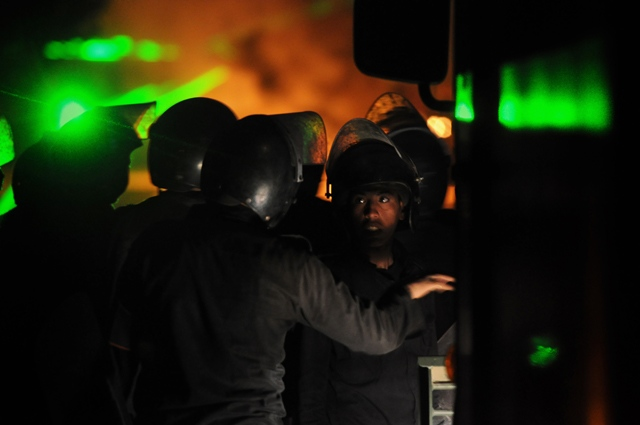
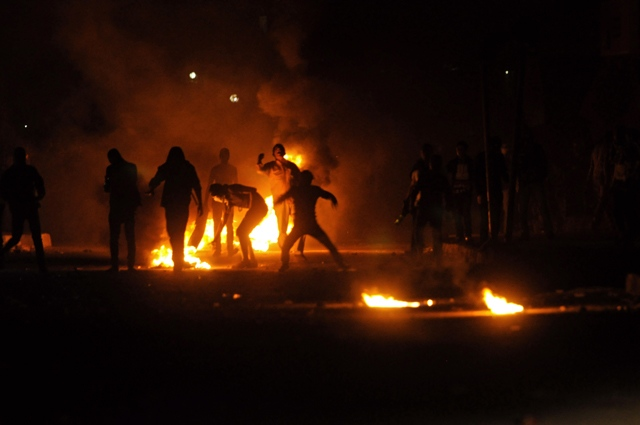
L’Égypte connaît en effet une grave crise des bouteilles de gaz, du gas-oil et du pain subventionnés qui sont à la base de la vie des classes populaires.
L’Égypte importe 60% de son gas-oil, l’État en subventionne les deux tiers pour les prix à la consommation, soit environ 55 milliards de Livres Égyptiennes chaque année. Or les réserves en dollars de l’État égyptien se sont effondrées et il n’est plus en situation de payer l’importation de gas-oil. En échange de son aide, le FMI a demandé une libéralisation encore plus importante de l’économie égyptienne (en partie encore dans les mains de l’État et surtout de l’armée) et des coupes draconiennes dans les subventions aux produits de première nécessité. Pour le moment, avant de passer aux baisses de subventions, l’État a augmenté des taxes et diminué la distribution de bouteilles de gaz et de gas-oil provoquant de graves pénuries et des hausses de prix sauvages au marché noir dans de multiples secteurs.
Il faut parfois faire la queue des heures et des heures voire une journée entière pour faire le plein de gas-oil subventionné. Bien des camionneurs, des chauffeurs de bus, microbus ou des paysans avec leurs tracteurs ne peuvent plus trouver le carburant nécessaire à leur travail. Le marché noir se développe. Certains pensent que hauts fonctionnaires et stations services trichent, ces dernières recevraient plus qu’elles ne vendent officiellement et écouleraient une partie de leurs stocks au marché noir à des prix beaucoup plus élevés. La conséquence, ce sont des hausses de prix considérables, ce qui renchérit les prix de multiples autres produits. Les fruits et légumes par exemple dont le prix a été souvent multiplié en peu de temps par deux ou trois en même temps qu’ils deviennent plus rares faute de distribution.
Mais ce sont aussi les bus scolaires, qui, faute de gas-oil, n’ont pu assurer le transport des élèves, beaucoup d’entre eux ayant manqué l’école, en particulier dans les petits villages, posant de nombreux problèmes aux parents. Or on approche du temps des examens où 18 millions d’élèves et d’étudiants vont vouloir se déplacer dans le pays.
Un des gros problèmes pour les gens, vient des coupures d’électricité du fait que les usines de production marchent au gas-oil. Le ministère du pétrole a déjà menacé le ministère de l’électricité de cesser de lui livrer du gas-oil si ce dernier ne lui payait pas ses 50 milliards de dettes. L’été dernier avait déjà été marqué par des coupures importantes dans les quartiers populaires (pas les riches) à un moment où les températures atteignent des sommets et où on a d’autant plus besoin des réfrigérateurs ou des climatiseurs. Cela avait provoqué tout l’été des émeutes populaires et des refus de payer les factures. Or déjà durant les trois dernières semaines, il y a eu des coupures d’électricité.
Mais le plus gros des problèmes est celui des boulangers et du pain. En effet les boulangers publics qui font et vendent le pain subventionné, base de l’alimentation des plus pauvres, n’ont pas reçu leur quota de gas-oil subventionné ce qui a déjà provoqué des pénuries. Mais ils craignent surtout ce que le gouvernement a annoncé, des cartes de rationnement du pain subventionné dans deux mois, en commençant à Port-Saïd. Ils n’ont guère envie de servir de boucs émissaires à la colère populaire. Aussi ont-il saccagé la semaine passée, pour la deuxième fois, le ministère de l’alimentation, comme des dizaines de minis émeutes, blocages de routes et voies ferrées, attaques de stations service ont traversé cette même semaine tout le pays, du sud au nord, pour exiger du gas-oil subventionné.
À cela s’ajoutent les hausses de taxe multiples qui ont déjà alimenté la colère populaire en décembre 2012 devant laquelle le gouvernement avait reculé. Mais il revient à la charge sous la presion du FMI. Il a annoncé ce mois-ci une hausse des taxes de 200% sur la bière et de 100 à 150% sur le vin. Et bien sûr, il justifie cela par des raisons religieuses. Lundi dernier le ministre de l’aviation a annoncé qu’il interdisait l’alcool dans les boutiques « duty-free » des aéroports. Le gouvernement pour sa part, a annoncé que les licences pour les débits d’alcool ne seraient pas renouvelées facilement et qu’il bannirait sa consommation dans les banlieues cairotes. Ainsi déjà dans la cité populaire du 6 octobre au Caire, cité de 1 million d’habitants, on ne trouve plus qu’un seul débit autorisé de boissons alcoolisées vendant les bières locales Sakara, Meister, Rex et Stella et les alcools étrangers. Mais l’Égypte est loin d’être fondamentaliste, des dizaines de millions d’Égyptiens boivent, surtout de la bière. Même les intégristes islamistes ou coptes boivent en cachette ou même pas. Ce qui fait que les distilleries et les fabrications diverses d’alcool plus ou moins clandestines, familiales ou plus larges, se multiplient. Ce qui n’est pas pour rien dans le rejet de l’islamisme rigoriste des Frères Musulmans ou des salafistes et dans l’incendie ou le saccage des sièges des Frères Musulmans. Après tout, la révolution française a commencé par des protestations et des émeutes aux barrières de Paris contre les taxes supplémentaires qu’on voulait imposer aux vins. Et Engels a décrit en son temps les émeutes de la bière en Bavière.
Dans tous les cas, les Égyptiens savent que le gouvernement ne pourra pas imposer plus que ça sa police des mœurs et des esprits. L’échec total du couvre feu qu’il a voulu imposer en février dans les villes du canal de Suez montre que sa perte d’autorité ne fait que dresser un peu plus le peuple égyptien contre tous les fondamentalismes et le pousser vers ce que ce dernier a appelé la « désobéissance civile », qu’on appellerait plutôt ici « grève générale », puisque le refus de payer les taxes, impôts et factures d’électricité, le refus d’obéir aux autorités d’État se mêlait au refus d’obéir aux patrons par de multiples grèves associant ouvriers, employés, étudiants, journalistes, enseignants, avocats, médecins, boutiquiers et artisans dans la recherche de leur propre administration directe. Le glissement du noyau central de la révolution des questions politiques vers les questions économiques, la prise en main progressive de la révolution par les couches les plus pauvres n’est autre que la transformation progressive de la révolution démocratique en révolution sociale, la recherche non seulement d’une démocratie politique directe mais aussi d’une démocratie économique, la remise en cause de la propriété.
La révolution égyptienne ne fait que commencer.
Jacques Chastaing, le 25 mars 2013
Anger rises against the Muslim Brotherhood
On March 22, thousands marched in protest outside the Muslim Brotherhood’s national headquarters. In retaliation, police and Muslim Brotherhood supporters unleashed a torrent on violence on the protesters, injuring nearly 200 people.
But this is only the most recent—and most visible—expression of growing bitterness at the direction of Egypt under the rule of President Mohamed Morsi and his Freedom and Justice Party, which is the political wing of the Muslim Brotherhood.
Mostafa Ali is a journalist for Ahram Online and member of Egypt’s Revolutionary Socialists. Here, he talks with Eric Ruder about what these clashes represent in Egypt’s ongoing revolutionary process.
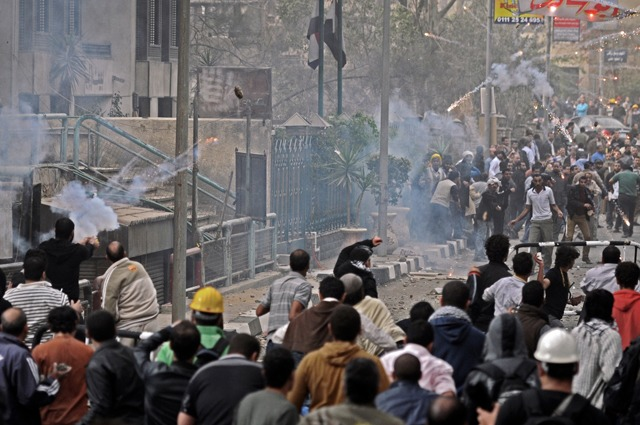
What triggered the recent protests against the Muslim Brotherhood?
The recent protests were triggered by the sheer brutality of the police and the Muslim Brotherhood in dealing with anti-Brotherhood demonstrations over the last few months. There was a demonstration in mid-March outside of the Brotherhood’s headquarters, and Brotherhood supporters organized themselves in militias and beat a few dozen peaceful protesters who were simply drawing anti-Brotherhood graffiti on the asphalt. In fact, they’ve carried out this kind of attack a number of times.
So a number of different currents came together to protest the Muslim Brotherhood’s national headquarters, which is located on top of a hill in Cairo. But this isn’t the first time that the Brotherhood has been the target of protests. For the past two or three months, there have been numerous demonstrations outside of and attacks on Brotherhood offices across the country.
But most of the demonstrations in the last few months have taken place in the industrial Nile Delta region to the north. The locus for the movement and the protests, therefore, has not been Cairo or Alexandria so much as the provinces, especially in the north. There have been attacks on police stations and other symbols of governmental and Brotherhood power, and in response, the violence against the protesters has been extreme.
Then on March 22, thousands marched on the Brotherhood’s headquarters. The demonstration was not called by the National Salvation Front, the coalition of mainstream opposition parties. In fact, most of the demonstrations and protests that have turned violent in recent months were organized locally and in a decentralized way. There have dozens or scores or hundreds or sometimes even thousands of angry people pouring into the streets in cities such as Mansoura and Mahalla.
And in the economically strategic city of Port Said (near the Suez Canal), an even more remarkable campaign of civil disobedience succeeded in kicking the police out of the city for several days. After high-school students and teachers spearheaded the initial protests, the movement spread, and the citizens defeated the police and took over control of everything in the city–from traffic control to the administration and distribution of services and other goods. The rest of the civil servants joined the teachers on strike bringing the city to a halt, and then port workers went on strike in solidarity with the public sector. Eventually, the army arrived and restored control of the city.
The backdrop to this citywide revolt is the massacre of more than 70 soccer fans, known as ultras, last year. Since then, the city has been essentially scapegoated for this crime, even though everyone knows that it was the remnants of the old regime and the police who orchestrated the violence. The city objected to being held responsible and is demanding that the old regime be put on trial instead of the residents of the city.
This seems like a significant shift since the victory of Morsi and the Brotherhood during last year’s elections.
Since taking power last June after Morsi won the presidential elections, the Brotherhood has indeed squandered widespread support as well as the hopes of millions of people. Of course, they inspired support from their hardcore supporters, but many millions more were hopeful that the Brotherhood would continue fighting for the goals of the revolution—bread, justice and freedom. That all evaporated very quickly in the last few months.
The level of anger had been rising since Morsi was forced to back down from grabbing vast new powers for himself last November, but now it’s beginning to boil over.
Two aspects of what the Brotherhood has pursued really stand out. First, Morsi and the Muslim Brotherhood want to preserve the state apparatus as it existed under Hosni Mubarak, who was the U.S.-backed dictator overthrown in Egypt’s 2011 revolution. Sure, they want to change some faces by replacing some of those whose loyalties to the old regime are most obvious, but they wish to keep intact the fundamental state structures, including its repressive powers such as the army and police. In that way, they have betrayed all hopes of reform.
In particular, there has been the return of police brutality on a scale unheard of even during the Mubarak years. Police kidnap, torture and even kill activists and demonstrators with impunity.
Second, Morsi and the Brotherhood have made clear their intention to continue with all of the neoliberal economic policies of the Mubarak regime—and worse, to push these policies even further. So the anger has been building up tremendously.
Morsi’s government has also announced a plan to ration the distribution of bread, limiting each individual to three loaves—but this is a population that relies primarily on bread in place of meat and vegetables, which are now quite expensive. And due to the plummeting of foreign currency reserves and the drying of foreign direct investment, they’ve decided to compensate for this by introducing an « Islamic bond law, » whereby the government will sell off major state assets, including factories and various municipal services, to international investors in the hopes of bringing in billions of dollars to turn the economy around.
These are really symptoms of a serious deterioration in Egypt’s economic situation during the past few months. The country’s foreign reserves are now at $15 billion, down from $25 billion at the time of the outbreak of the revolution. There’s been no new investment coming into the country for two years now. Worse yet, there’s been massive capital flight out of the country. For example, at least 50 percent of the building and construction industry has collapsed, either ceasing operations or moving out of the country altogether. This is a huge section of the economy.
Mubarak also left behind a very fragile infrastructure, and it has continued to crumble—with lethal consequences—in the last two years. For example, safety measures on the nation’s railroads are in a complete shambles. We’ve had a number of train accidents that killed dozens of people in the last few months.
The railway system’s atrocious safety record has led to dozens of strikes by local unions up and down the country. In some cases, workers have cut the tracks, and because most people live along the Nile, this has led to a shutdown of national rail traffic several times in the last few months.
We also have a serious diesel shortage that has caused massive traffic jams in city after city, leading to numerous strikes in recent weeks by microbus drivers—the main form of transportation for tens of thousands of workers. Power outages are now a daily occurrence in Egypt for the first time in decades. You’re lucky if you lose power for one hour. In the poorer parts of the country, it could go out for two or three hours. Not to mention the disastrous state of health care, in a country that has the highest rate of Hepatitis C transmission in the world. The government has refused to increase the investment in education and health care.
The economic situation is so chaotic that international financial ratings agencies, such as Moody’s, have downgraded the rating of Egyptian bonds to very low levels. Now the government wants to line up a loan from the International Monetary Fund (IMF) for $5 billion in order to upgrade its credit and be able to re-invite international investors into the country. But in order to secure this loan, the U.S. and the IMF are insisting that the government carry out a massive neoliberal program that would get rid of fuel and food subsidies.
The government has been putting these measures on hold for as long as possible, because they are afraid of a massive popular reaction against the removal of subsidies for a population that already lives on $2 a day. This will accentuate and deepen the economic crisis and raise the level of political unrest in the country.
In sum, Mubarak and 30 years of neoliberalism have left the country in a shambles, and the Brotherhood has taken over this legacy and this system. Instead of reform, they have decided to continue these policies, but on steroids.
What is the relationship of the National Salvation Front (NSF) to these current mobilizations against the Brotherhood?
The National Salvation Front has not called for any protests since the second anniversary of the revolution on January 25. It’s an ironic situation, really, because most of the parties in the NSF—the liberal parties in the NSF—do not have fundamental disagreements with the Brotherhood when it comes to social and economic priorities.
In fact, the leader of the NSF, Mohamed ElBaradei, has said on more than one occasion that he agrees with the Muslim Brotherhood’s determination to secure an IMF loan and to continue with the program of « economic reform »—in other words, to impose neoliberal measures to privatize the national economy.
While some of the youth in the NSF do participate in the demonstrations, the NSF leadership is hoping to reach some kind of a compromise with the Brotherhood. The problem, from their point of view, is that the Brotherhood is refusing to sit down and talk to the opposition to reach a middle ground.
Many people think that the Brotherhood’s leadership is convinced that this is its chance to not only run the country, but to secure its own unilateral control over the state apparatus. And believing that it has the support of the United States, they figure that this is a golden opportunity that should not be squandered—and thus their lack of interest in sharing power with other political forces.
Indeed, the NSF garners the support of mostly middle-class and upper-middle-class elements, which do not want to see the Brotherhood rule the country because they oppose Islamic rule for political and/or social reasons. But they don’t have a serious problem with the economic priorities of the Brotherhood.
So the NSF is cut off from the masses of people who are suffering the brunt of this deep economic crisis. Neither the Islamists of the Muslim Brotherhood nor the liberal leaders of the NSF are able to address the day-to-day needs of the working class and the poor peasants in terms of bread, in terms of fuel, in terms of education or health care.
The NSF does not have an economic program that it could articulate as an alternative to the Muslim Brotherhood. For this reason, many people think of recent events as nothing more than a power struggle among rival ruling factions, and rightly so.
It seems like whatever popularity Morsi and the Brotherhood once enjoyed was because they were considered to be an « opposition » to the Mubarak regime. But now they’ve become the ruling force in society, and so the Brotherhood itself is now the target of people’s grievances about the economic situation and falling living standards. At various points, there were some cleavages in the Brotherhood that expressed these same dynamics—where the upper leaders of the party were more conservative, big businessmen and committed to the economic program of neoliberalism, versus the poorer, downtrodden elements that are Brotherhood members and supporters. Do you see any of those cleavages today? And if so, what form is that taking?
The failure of the Brotherhood to address popular needs, and the fact that the Brotherhood is using the state apparatus—the hated police force, the remnants, which are still intact, of the old security apparatus—and the fact that this is all causing massive popular anger, has led to serious divisions among the Islamists as a whole.
The Brotherhood, the Salafists and various other Islamic currents are going in very different directions. For example, the main Salafist party, the Al-Nour Party, which is to the right of the Muslim Brotherhood in many ways, has been distancing itself from the Brotherhood. They’ve seen that the Brotherhood is sinking the ship, so the alliance between the two main parties—the Brotherhood and the Salafist Al-Nour—is now on hold. Al-Nour has been critical of the Brotherhood and has been flirting with the liberals.
On the other hand, there are the very right-wing Islamist groups. The main group—the al-Gama’a al-Islamiyya—are the old jihadists from the 1970s. They were responsible for the assassination of President Anwar Sadat, and they carried out many terrorist operations in the ’80s and the ’90s against tourists and the police apparatus. They have decided that the Muslim Brotherhood is unable to use the old police force to maintain security in the country, so it has formed « security militias » in various parts of the country, especially in upper Egypt.
But while there have been divisions between various Islamic currents, there haven’t been any obvious fissures within the Brotherhood itself.
So the Muslim Brotherhood and Morsi are hanging onto power through the use of the repressive apparatus of the state, but enjoying very little popular support. Meanwhile, the political opposition in the form of the NSF is unable to galvanize the broad anti-Brotherhood sentiment into anything approaching an effective force that might be able to fight for real change.
Finally, there’s the left and other such organizations made up of the most steadfast revolutionaries, but at the moment their forces are too small to move things forward. The left has actually tried to build a third alternative to both the Brotherhood and the NSF. At least 10 or 15 different revolutionary groups—youth groups and other radical organizations–have attempted to build a revolutionary front as an alternative to both groups.
Unfortunately, there has been tremendous pressure from the NSF on the younger and more radical elements within the liberal and leftist parties to not break with the NSF, and this has derailed—so far, anyway—the formation of a third force in Egyptian politics.
On the ground, however, the left and the revolutionaries—the youth sections of a number of liberal and radical parties—have coordinated from the bottom up in some places and have built a united front that actually stood up to the old state apparatus and the Brotherhood.
The best example of this was in the universities, where broad coalitions of leftist, liberal and revolutionary students managed to score an unprecedented victory over the Muslim Brotherhood in the elections to the student councils. Of course, with millions of Egyptian students in universities and in local colleges, this is a huge victory—especially given that, during 30 years of the Mubarak regime, the Muslim Brotherhood, despite persecution by the state apparatus, managed to control most of the student councils in the universities around the country.
Now, despite having the Brotherhood in power running the state apparatus and despite a student election carried out under a Brotherhood administration, the revolutionaries still managed to trounce the Brotherhood, which did not win more than 20 percent of the seats in the student councils.
This actually points to a great potential for revolutionaries, radical students and the left in general to build an alternative to both the liberal NSF and the Brotherhood from the bottom up.
Of course, it’s going to be a very difficult and long process in the absence of revolutionary political parties that can continue to generalize the lessons of the struggles in the universities and to connect those struggles on a daily basis with the flood of strikes and popular struggles that take place in poor neighborhoods. That’s a challenge that remains to be met, and it’s of course happening in the context of constant political unrest and threats from far-right Islamist groups.
Even more important is the threat of a coup by the army—in the context of the inability of the Brotherhood to provide any kind of rational management of the state that would meet people’s needs. For the time being, however, the Brotherhood maintains the loyalty of the police and the army in a clear deal with the U.S. The Egyptian military is completely bound to the wishes (and orders) from Washington, and it seems that they have not been given any green light to carry out a military coup against the Brotherhood, at least in the near future.
This gives the far-right Islamists the chance to organize on the ground, but it also creates some space for revolutionaries and the left to try to build organizations and to relate to the struggles that are going on.
In early March, Secretary of State John Kerry travelled to Egypt and announced $250 million in aid. What is the U.S. role in Egypt?
The U.S. government has discovered a hidden treasure in the Muslim Brotherhood’s rule in Egypt. The U.S. was always allies with Mubarak, and Mubarak, for the most part, secured U.S. interests in the area: in particular, use of the Suez Canal as a trade route for the benefit of multinational corporations, and secondly, protection of the state of Israel (for example, through enforcement of the siege of Gaza).
But the United States, to its delight, has found that the Brotherhood is doing what Mubarak used to do, but more effectively. I’ll give you an example. For the very first time in years, the Egyptian military has been demolishing the hundreds of tunnels that have been used to smuggle both food and arms to Gaza. They’re bombing these tunnels with jet fighters.
Even though Hamas—long considered one of the Brotherhood’s closest regional allies—is protesting these actions of the Egyptian military, the Brotherhood has continued with this operation. Israel couldn’t be more pleased that the Brotherhood is demolishing the tunnels; after all, this has been an objective that Israel wanted to accomplish for years.
The Brotherhood has kept up the pressure on Hamas in the last few months in other ways as well, despite Operation Pillar of Cloud, which was the last Israeli assault on Gaza. For example, Hamas has been abiding by a ceasefire with Israel, which was brokered with the help of the Brotherhood.
Secondly, the close relationship between the Brotherhood and Turkey has allowed the Brotherhood to mediate a reconciliation between Turkey and Israel in recent days. The Brotherhood also has a very good relationship with Qatar, which is one of the main and most enthusiastic allies of the United States in the Gulf at the moment.
The United States is really looking at a bigger regional role for an Egypt ruled by the Brotherhood, and the Brotherhood is absolutely enthusiastic about this. They want to prove to the United States that they can do a better job than Mubarak, and so far, they have been performing admirably.
It’s one of the main reasons that they remain in power, and it’s why John Kerry, when he met with the head of the Egyptian army during his recent visit, made it clear that the army must respect the political will of the Brotherhood, despite its failures at imposing domestic order.
Looking forward, Morsi had called for elections that were to run from April to June. Now there seems to be a judicial challenge to that. What is the significance of these elections, and what’s next in terms of the struggle to safeguard the revolution?
The Brotherhood and the army made a deal two years ago at the outbreak of the revolution, whereby the army would facilitate the holding of elections, and these would enable the Brotherhood to come to power.
The Brotherhood now has pushed through a referendum on the constitution, in which they won 63 percent of the vote, and there have been five different elections, which the Brotherhood has won time and again. They now control the upper house, and they control the presidency. They also wanted to force through an election for a lower house in an undemocratic way.
But now situation is changing. The judiciary has challenged the Muslim Brotherhood’s new election law for the lower house, so that’s been put on hold. That would not have been possible without growing popular disillusionment with the idea of holding « democratic elections » as a way of solving the country’s economic and political problems.
I’ve talked to many people who were enthusiastic about going to the polls at the outbreak of the revolution. They went time and time again and stood in line for five and 10 hours to vote. But that excitement—the hope that liberal democratic elections would bring magical solutions—has waned among many people.
So the Muslim Brotherhood figured they would buy some time and postpone the elections for a few months, hoping to stabilize the situation economically and politically. But it’s not clear that they will be able to do so—given that they’ve supported a revamped, rearmed police force that is constantly angering people on the streets through the use of torture while simultaneously backing economic policies and an IMF loan that, if secured, will cause a massive outbreak of tremendous popular anger.
The situation remains in flux. No one side—not the Brotherhood, not the liberal opposition—seems to have a way out or a solution.
As the electoral route now appears hopeless, some people have concluded that direct action—against the state and against the Muslim Brotherhood—is the only way to get rid of the Brotherhood’s resuscitation of the old regime. And the sentiment is that even if we don’t get rid of the Brotherhood, we can at least wreak havoc. Many of these forces have courageously confronted the police in city after city, and in the Delta, they courageously marched on the Brotherhood headquarters and burned it.
But fortunately there’s also a large section of people, and of revolutionaries, who realize the shortcomings of this strategy of direct action and understand that the state apparatus and the Muslim Brotherhood will not be defeated through direct action alone. They will hold onto their power and use a tremendous amount of repression to defend themselves.
So there’s an open debate now about which way to go forward, because direct action and attacks on the Brotherhood headquarters and constant daily confrontations with police and attacks on police stations—justified as they are, of course—are not the way forward. If the old liberal, and current liberal, political parties can’t provide a way forward, there has to be a third way—a revolutionary alternative.
If it’s not direct action on the Muslim Brotherhood’s headquarters, what kind of strategy is needed to move the revolution forward?
A good example is in the democratic struggles that have taken place in a number of institutions. One example of course is what happened in the universities, whereby the students formed a coalition and participated in an undemocratic election and beat the Muslim Brotherhood candidates, but they’ve also have been able to organize to stop physical attacks and defend themselves against Brotherhood supporters who attack leftists and revolutionary students.
You also see it in the elections to the journalists’ syndicate, whereby the left and non-Islamists defeated the Muslim Brotherhood, which didn’t win a single seat on the executive board. This is also happening in the pharmacists’ union, which is a big union, where the Brotherhood couldn’t win more than 20 percent of seats on the executive board for the first time in a long time.
So you have democratic struggles that are happening in a number of different areas, whereby the power of organizing, the power of numbers, shows itself as the key way to defeat the Brotherhood and to expose how rightwing, how pro-business and how anti-worker their agenda is.
So on the one hand, we have examples of what needs to be done, but we also have a very volatile situation. There’s a daily level of class struggle that is quite high—such as strikes or people in poor neighborhoods ripping up rail lines because they’re getting killed and there are no signals to stop the trains. We have a great number of small struggles around the country, especially in the last few months, but they’re not connected in a way that allows them to build on one another. The lessons are not being generalized.
You need revolutionary organizations and political parties that can actually connect these struggles and generalize the lessons that are learned from certain strikes—whether it’s in the universities or the Suez Canal.
That remains the way forward, and it’s not utopian—the struggle does exist and there is a rejection among a lot of workers of both the liberal program and the Islamist program. But the alternative has to be built, and it’s not impossible or too late.
Entretien avec Mostafa Ali, propos recueillis par Eric Ruder, Socialist Worker, 25 mars 2013

Ping : Αίγυπτος: ο φόβος αλλάζει στρατόπεδο | Πρακτορείο RIOTERS